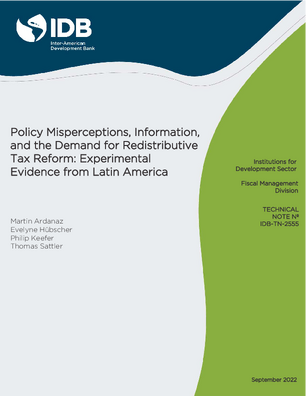Policy Misperceptions, Information, and the Demand for Redistributive Tax Reform: Experimental evidence from Latin America
Date
Sep 2022
Scholars have long struggled to understand why individual preferences for redistribution often diverge widely from their material self-interest. The puzzle is acute in Latin America, largely democratic and yet one of the most unequal regions in the world. Using an original online survey experiment spanning 8 countries and 12,000 respondents across Latin America, we find significant evidence for an under-explored explanation: misconceptions regarding the distributional effects of current tax policy. Treated respondents who are informed that an increase in the value-added tax (VAT) is regressive are significantly more likely to prefer policy reforms that make the tax more progressive. We are further able to identify mechanisms. A large fraction of respondents underestimate the regressivity of the VAT. Their misperceptions are linked to fundamental views about the world: these respondents are disproportionately right-leaning and more likely to attribute success to individual effort than luck. Despite the deep-rooted nature of their misperceptions, treatment effects are largest among individuals who believe the VAT is not regressive. These findings contribute both to understanding the political economy of redistribution and the potential for information interventions to shift support for fiscal adjustment policies protecting the most vulnerable.




